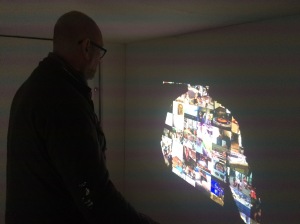I had a lightbulb moment the other day about digital data. Is it even OK to say ‘lightbulb moment’ anymore? Surely there is a better 21st century equivalent. An ecstatic brainwave emoji perhaps? Anyway my idea was very obvious and simple really.
I was at the rather brilliant Collusion #DataShadow event created by artist Mark Farid, where your data from your phone was projected inside a shipping container. One one side were all the messages you had sent and on the other were the images you had sent too…
This was fascinating – you were on your own and confronted with your own data. Afterwards there was a two hour series of presentations and provocations as part of Cambridge Festival of Ideas. As a part of this, the questions still keep coming up about what our data could be used for, what it was worth, how it could be used to sell us better stuff on our social networks, that kind of thing. All the time the questions were about what it could be used for NOW.
It was at this point I made a leap of thought, and realised that possibly it is for the artists, poets, and storytellers of the future who will make sense of the data of the past to tell the stories of tomorrow. So, think about it – our great grandchildren will be able to hear our voices on videos, see our pictures, read our blogs and listen to our favourite music via our Spotify playlists. It is from this digital archaeology that the dramas, movies, and stories will be built from.
This is all about building our shared narratives as human beings – it is what we have always done and it is what we will clearly continue to do. So the fact that some organisations know my age, my inside leg measurement, where I last went on holiday and my music tastes – it can possibly send me an ad for summer shorts or ski pants but it can’t ever know what I was thinking at the time, what my dreams where and where the next germ of an idea of a project was coming from.
It is from the data and the shared stories of people who we know and care about that form the understanding of some of the aspects of that individual. But for sure, if I could listen to my great grandparents’ Spotify playlist I am pretty sure I would. And that is what will happen for us as we move on.
So the question is – how do we preserve our digital footprint, our stories and data – to help provide the narrative for the artists of tomorrow?
Yes, I have an idea…

